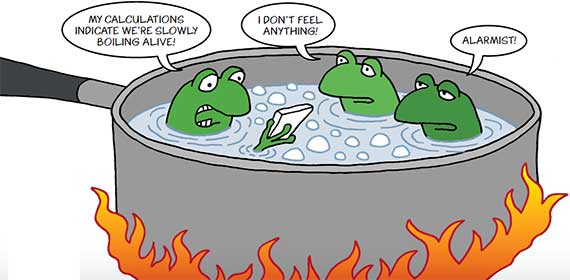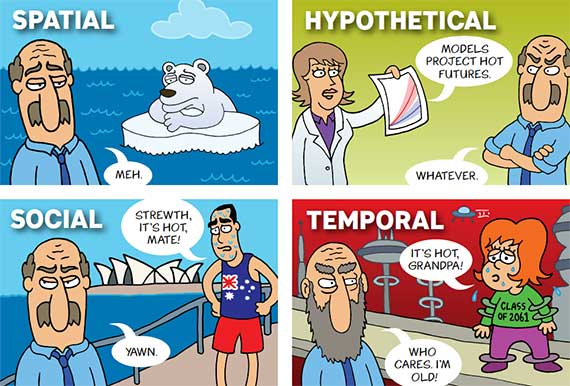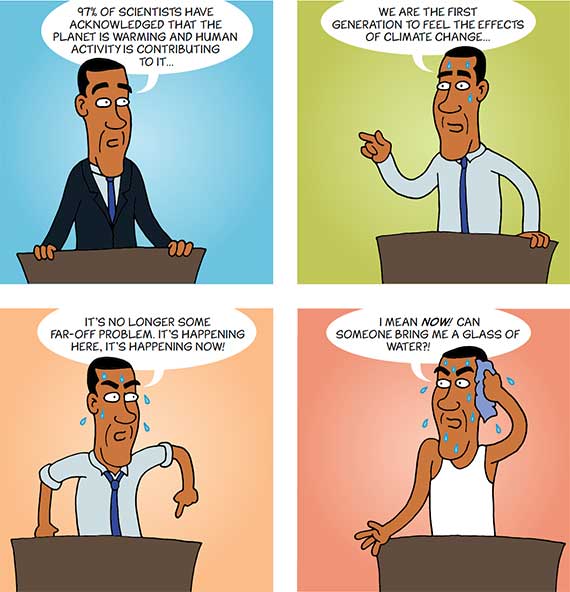Global warming is happening here and now
Posted on 28 January 2020 by John Cook
An excerpt from the book Cranky Uncle vs. Climate Change, released Feb 25.
Signs of global warming are being observed all over our planet. Thermometers measure surface warming. Buoys sunk to ocean depths measure heat building up in our oceans. Ice is melting across our planet, with ice sheets crumbling and glaciers retreating. Spring is coming earlier. Sea levels are rising. Species are migrating to flee warming temperatures. Even tree lines are shifting!
Over the last century and a half, our planet has warmed around 1°C. This involves a huge amount of heat, with negative impacts all over our planet. But locally, we experience tens of degrees of temperature change every day, so one degree doesn’t seem like much. Like frogs in a pot slowly coming to a boil, we find the severity of global warming difficult to grasp.

The notion that global warming is some far-off, distant threat is an insidious but prevalent misconception. It arises in part from the way we maintain psychological distance from our fears. We think of something as psychologically distant if we’re not directly experiencing it.
Psychological distance manifests in different forms—thinking that global warming is happening in the distant future, that it’s happening in far-off places (this misconception perpetuated by clichéd images such as polar bears), that climate impacts are hypothetical and uncertain, and that the impacts are happening to communities different from us.

In reality, global warming is already happening and affecting all parts of society, in every corner of the world. As President Obama often reminded us, global warming is happening here and now.

 Cranky Uncle vs. Climate Change uses cartoons, climate science, and critical thinking to make sense of climate denial and misinformation. Guided by psychological research into how to refute misinformation, the book embraces a creative approach, using cartoons and visual analogies to make the science engaging and accessible to readers. The book is written and drawn by John Cook, a former cartoonist who now researches climate communication at George Mason University. Cranky Uncle vs. Climate Change will be published by Kensington Books on Feb 25. Sign up for latest Cranky Uncle news at crankyuncle.com.
Cranky Uncle vs. Climate Change uses cartoons, climate science, and critical thinking to make sense of climate denial and misinformation. Guided by psychological research into how to refute misinformation, the book embraces a creative approach, using cartoons and visual analogies to make the science engaging and accessible to readers. The book is written and drawn by John Cook, a former cartoonist who now researches climate communication at George Mason University. Cranky Uncle vs. Climate Change will be published by Kensington Books on Feb 25. Sign up for latest Cranky Uncle news at crankyuncle.com.
Other excerpts from Cranky Uncle vs. Climate Change:
How did climate change get so controversial?
Why is the Keeling curve so curvy?
Climate goes extreme!































 Arguments
Arguments
































Congratulations on the book, John. I see that you have gone back in time to marry your pre-doctorate graphics arts and cartooning skills with your climate communication expertise. I will buy a copy of the book to help support you and your efforts - and to add to my repertoire of denialist-fighting sources.
It will be interesting to watch the hordes of coordinated denier and right-wing idiots flock to Amazon to post nasty negative reviews without reading the book. But as they say, even negative publicity can be good, because it brings attention to a critical subject and a source of good information.